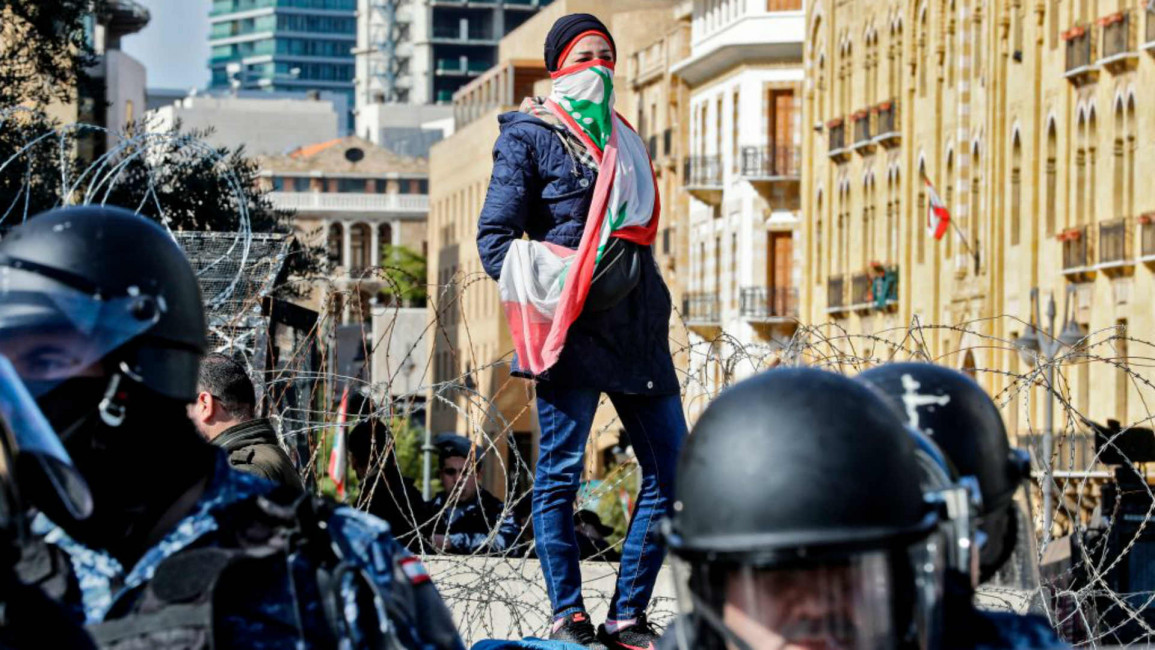
Lebanese leaders hoped protesters would go home. They won't, and here's why
Protest fatigue, disillusionment, and partisan violence helped dampen protestors' spirits in December as the country's leaders struggled to form a new government that would appease the street and pave the way for Lebanon's economic recovery.
Yet in mid-January, demonstrations started up again, this time with a new ferocity and at times turning violence, just in time for recetly appointed Prime Minister Hassan Diab's cabinet to be unveiled on 21 January. Nationwide marches have now continued into February.
Now, Lebanese authorities are attempting to force another round of protest doldrums, this time perhaps permanently. Over the last several weeks, security forces have used instances of rioting to justify the use of excessive force and intimidation tactics, along with mass arrests, and they have also taken steps to limit the ability of people to demonstrate altogether.
New concrete walls and police fences have been erected across Beirut's downtown, and late last month, there were attempts to open Martyrs' Square to traffic for the first time since October 17.
But in the long run, tactics like these are inevitably doomed to fail. Few Lebanese are convinced that Prime Minister Hassan Diab's new government is anything but a refashioning of the status quo under the tutelage of Hezbollah and its political allies, and there remains no credible solution to stop Lebanon's downward spiral toward economic ruin and mass poverty.
 |
Lebanese authorities are attempting to force another round of protest doldrums |  |
Under other circumstances, the political will to revolt may have evaporated by now. But in Lebanon, deteriorating material conditions and ever-rising frustration with the political elite's inability to relieve public suffering means that the country's months-long unrest will not be stifled anytime soon.
In the eyes of Lebanon's leaders, the political class has done its job - it has paid lip service to the aims of the revolution, allowed people to protest peacefully, and has created a new government that keeps them at the reins while giving the illusion of progress. Now, they want a return to normalcy.
But the steps the new cabinet has taken have not convinced demonstrators and civil society to give them what they want. Although the cabinet is indeed full of new faces and includes several ministers who are experts in their fields, it is far from independent.
Not to mention, Lebanon's parliament has remained unchanged since the beginning of the protests and is still headed by one of the demonstrators' primary targets, Speaker Nabih Berri.
It is difficult to imagine that any of Lebanon's corrupt politicians will face accountability for their crimes before a shift takes place here first, ideally spurred by new elections under the auspices of a revised electoral law.
Yet political changes like these are only part of the solution. Diab's cabinet has yet to lay out a credible economic recovery and reform plan that will convince the international community to lend its support to Lebanon.
The 2020 budget passed by parliament this week is unrealistic and offers little that would alleviate the country's economic crisis. Although no new taxes were proposed, no economic assistance to the Lebanese people has been discussed either, even though rates of poverty in the country are set to rise if current realities continue.
It is no surprise then that many of the most committed demonstrators this month have hailed from the poorest parts of Lebanon - Tripoli, the north, and the Beqaa Valley. Without changes in material conditions, these people have little incentive to leave the streets. After all, how can they be expected to return to their daily lives when their already dire standards of living are degrading even further?
 |
How can they be expected to return to their daily lives when their already dire standards of living are degrading even further? |  |
Ultimately, political ideals aside, the longevity of this protest movement will be determined by people's quality of life. The longer that access to basic goods and services is not available to Lebanese people at the bottom, and the longer that the Lebanese nation feels stifled by its traditional sectarian leaders, the longer these protests will go on.
Parties such as Hezbollah that have urged Lebanon to give this new government a chance are missing the point - words and promises are not enough anymore.
Although protest energy may wax and wane, Lebanon's landscape has been forever changed by the realisation that a broad popular movement can indeed command power here. At the end of the day, so long as tangible changes don't take place in people's lives, masses of demonstrators are guaranteed to come back down to Lebanon's streets.
"If I go back home, maybe my son will come down," a protester told me last month in front of the concrete security barrier that went up in Riad al-Solh Square. "If a tired person sits, there is another who will come."
Michal Kranz is a freelance journalist based in Beirut, covering everything from US national security to refugee issues in Lebanon.
Follow him on Twitter: @Michal_Kranz
Opinions expressed in this article remain those of the author and do not necessarily represent those of The New Arab, its editorial board or staff.




